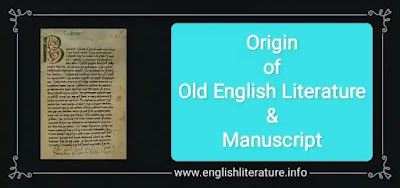Also Read
The Romans left England in 410. The British population was exposed to the inroads of the invaders from the North. The Angles and Saxons settled in the last quarter of the fifth century if not before.
The earliest English poetry that grew on the soil of Great Britain was unwritten and has now become extinct. It probably consisted of songs and legends dealing with the deeds of the ancient heroes, Sung by the minstrels, who orally composed them, to the accompaniment of the harp and handed down from generation to generation. Children learned these tales from their parents and thus they continued. It was when the Anglo-Saxons conquered the island in the latter part of the fifth century AD. and settled therein, that the regular history of English literature began. These forefathers of the modern English people were originally heathens, who came from Germany. By the middle of the sixth century, almost the whole of England with the exception of Wales was swept away by the flood of Anglo-Saxon Paganism. These people had some native poetry of their own when they lived in their original continental home and some of these they brought to Britain. But none of their poems had anything to do with Britain, though most of them were written down here in later times. This is what is meant by the expression "the Pagan origin of old English poetry". It was much later on, after the introduction of Christianity in the island by 600 A.D. that the monks set them in writing and in this process, they infused much Christian sentiment into the original heathen poems. Hence the strange blend of the apparently incongruous Pagan and Christian sentiments in these poems. Most of the extant old English poetry thus belongs to the Pagan and continental tradition (Beowulf, Widsith, Dear, Battle of Finnsburh, for instance), with a strong leavening of the Christian morality.
The surviving Old English poetry is preserved in four Manuscripts, attributed to the eleventh century, (1) The first of these is the Junius Ms. named after the scholar who was Milton's friend and who bequeathed it to the Bodleian Library, Oxford. It was first printed in 1655. It contains the so-called Cædmonian poems; (2) the Exeter Book, which was given to the Exeter Cathedral by Bishop Leofric in the eleventh century. It was almost forgotten until 1826. Its contents are two signed poems of Cynewulf, elegiac poems, riddles, etc.; (3) The Beowulf Ms. in the British Museum, unknown till the end of the eighteenth century. Its contents are Beowulf and Judith; (4) the Vercelli Book (in the Cathedral library of Vercelli in North Italy), discovered in 1832, containing two signed poems of Cynewulf, and Andreas and The Dream of the Rood. The history of Anglo-Saxon prose is more or less clear and definite. This prose literature is mainly the work of King Alfred, and two churchmen, Ælfric and Wulfstan. The King's contribution is most considerable, consisting of translations of famous Latin works and the Anglo-Saxon Chronicle. Ælfric's Lives of the Saints and Wulfstan's Sermo Lupi are notable works.
The surviving Old English poetry is preserved in four Manuscripts, attributed to the eleventh century, (1) The first of these is the Junius Ms. named after the scholar who was Milton's friend and who bequeathed it to the Bodleian Library, Oxford. It was first printed in 1655. It contains the so-called Cædmonian poems; (2) the Exeter Book, which was given to the Exeter Cathedral by Bishop Leofric in the eleventh century. It was almost forgotten until 1826. Its contents are two signed poems of Cynewulf, elegiac poems, riddles, etc.; (3) The Beowulf Ms. in the British Museum, unknown till the end of the eighteenth century. Its contents are Beowulf and Judith; (4) the Vercelli Book (in the Cathedral library of Vercelli in North Italy), discovered in 1832, containing two signed poems of Cynewulf, and Andreas and The Dream of the Rood. The history of Anglo-Saxon prose is more or less clear and definite. This prose literature is mainly the work of King Alfred, and two churchmen, Ælfric and Wulfstan. The King's contribution is most considerable, consisting of translations of famous Latin works and the Anglo-Saxon Chronicle. Ælfric's Lives of the Saints and Wulfstan's Sermo Lupi are notable works.
